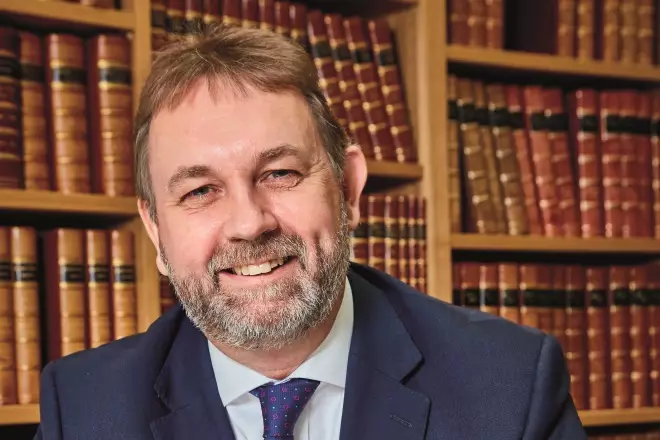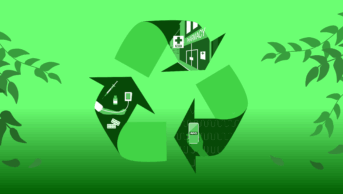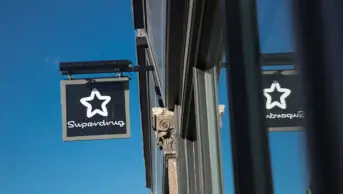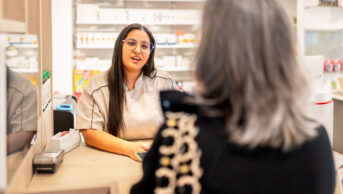
Source: Dave Phillips
Climate change is “the most significant health threat that modern society has ever faced”. That was the stark warning of the Royal Pharmaceutical Society (RPS) as it published its declaration of climate and ecological emergency on 1 September 2021.
The declaration committed the RPS to lead the profession in taking personal actions, lobbying and building networks to tackle the emergency from a pharmaceutical perspective. According to the RPS, it is part of a wider programme of work that will be set out in more detail soon.
To find out what members can expect to see from this programme of work, The Pharmaceutical Journal caught up with Paul Bennett, chief executive of the RPS.
What was the motivation behind the RPS’s declaration of climate and ecological emergency?
When we were talking about the work plan for 2021, our elected members of the national pharmacy boards were very keen that this area was given a high degree of focus. We’ve all experienced, and seen in the news, just what the environmental changes have been like for so many people over the past few months: tremendous floods, forest fires and sweeping changes to climate.
We believe we’ve got a real opportunity to make a difference by putting focus on the issue. Frankly, as a professional leadership body, it’s the sort of thing we ought to be doing: taking leadership in this space, encouraging and facilitating those who’ve got expertise in this area to share their insights. But also to raise the profile of the challenge that we’re all confronted with. It is the biggest challenge that the human race has faced for a very, very long time.
When can we expect to see a project plan with some specific actions?
Very shortly. It’s right that we take a little bit of time to make sure that we prioritise the right areas. We can’t afford to waste time, but it’s important with any significant piece of work to take an appropriate amount of time to make sure your plan is right.
The RPS plans to lobby governments about this issue. Is there anything more you can tell us about that?
We’re having some constructive conversations with the Green Party in Scotland, talking about our concerns and exploring alignment. We have met with a host of other organisations and bodies to see how we can best collaborate, including pharmaceutical companies, members of Pharmacy Declares, the International Pharmaceutical Federation (FIP), the UK Health Alliance on Climate Change (UKHACC), and the Professional Association of Research Networks (PARN).
The Society has also agreed to sign up to the PARN Professional Bodies Climate Action Charter and to join the UKHACC that the British Medical Association, Royal College of Nursing and medical royal colleges are also members of. This will assist with our collaborative approach to addressing the challenge and help with our lobbying of governments.
We are having very productive conversations in Wales, too. And, of course, the NHS itself is also very active in the space and is a big lobbyist for change. So, we’re looking to see how we can align with work that’s going on elsewhere, to contribute to that and make a real difference.
In August 2021, The Pharmaceutical Journal discovered that NHS England has no plans for a national inhaler recycling scheme. Is that something that you would like to see in place?
I’m glad you’ve mentioned it because we published an interesting blog by Anna Murphy, a consultant respiratory pharmacist at University Hospitals of Leicester, on inhalers, in September 2021. I’m an asthmatic: a well-controlled one, but I do use inhalers, and Anna’s article talked about the contribution that metered dose inhalers (MDIs) play.
There should be schemes in place so that patients know how to dispose of their inhalers when they are finished, and it doesn’t add to the environment challenge
There’s something like a 3% NHS carbon footprint associated with MDI use in comparison to the much lower contribution of dry powder inhalers (DPIs). Anna’s blog talked about the importance of trying to encourage patients, where it’s clinically appropriate, to move from MDIs to DPIs. That’s a good example of how pharmacists can help make a real, meaningful difference: but it also shines a light on the whole issue. The end to end — if you like, the lifecycle — of drugs from discovery right the way through ultimately to disposal and that is something that pharmacists have a real opportunity to influence.
It does concern me that there is a lack of a national disposal scheme for inhalers. I try to recycle at home as much as I possibly can. But my understanding is that readily recyclable plastics are not used in these inhalers. So, if they go to landfill or incineration that’s contributing in a very negative way to the problem. I do hope there’s an opportunity for schemes to be established, whether they are locally established or whether there’s a national scheme. I think the important thing is that there should be schemes in place so that patients know how to dispose of their inhalers when they are finished, and it doesn’t add to the environment challenge.
What influence would you like the RPS to be able to have through industry, manufacturing, transportation and that side of things?
There’s a real opportunity here, through our connections with the pharmaceutical industry, those involved in the education of pharmacists, pharmaceutical scientists, as well as with those who are involved in healthcare distribution — wholesalers, pharmacy operators, primary care and secondary care sectors. We’ve got a broad reach and opportunity to influence.
There’s another example of an RPS blog, published on 1 October 2021, that I think is really interesting: Sharon Pfleger, a consultant in pharmaceutical public health at NHS Highland, wrote an article about waste medicines getting into the watercourse and how that can have an environmental impact (for example, female hormones having an impact on fish, leading to a real challenge around fish stocks). So, looking at how you can make a difference using new technologies — nanotechnology, for example — to try to reduce, minimise and ultimately stop waste medicines entering the watercourse is another area where pharmacists can bring their expertise to help make a difference.
There are many avenues that pharmacists and pharmaceutical scientists can use to try to make a difference, and our job as a leadership body is to help stimulate discussion and share good practice where we hear about it.
Do you think sustainability should be given a more emphasis in pharmacy education?
I’d very much like to see that. I know that the team are keen to engage with the Pharmacy Schools Council and universities directly to see whether more emphasis might be able to be placed on this. We find that from conversations with students and early career pharmacists, this is an area of great interest and students would be drawn towards course providers who place emphasis on such important matters. So that dialogue is to commence, but we’re very keen to have it.
If a pharmacist who is reading this wants to know what difference they could make today, what would you say to them?
I would say: inform yourself, take the opportunity to access some of the resources that are available on the RPS website and in The Pharmaceutical Journal. The articles that have been published might stimulate some thinking about how your day-to-day practice could potentially change as a consequence of a greater awareness around the environmental challenges that exist.
Identify if you’ve got colleagues locally who are interested in this, that you could talk to; understand, if you’re an employee, what your organisation’s approach to this is — many have corporate social responsibility strategies and agendas that touch on this so it’s definitely worth investigating that further. And look out for the RPS Connect networks to be established as well.
Everybody has an opportunity to make a contribution, however small it might feel, and cumulatively it will start to make an impact
I think the other thing is taking a little bit of personal responsibility in your day-to-day life: we’ve all got an opportunity, I think, to, do that, whether it’s recycling more; thinking carefully about whether travel is essential and what alternatives there might be. I think everybody has an opportunity to make a contribution, however small it might feel, and cumulatively it will start to make an impact.
I also want to touch on what we are doing ourselves, as an organisation. I am proud of the work that the team at the RPS has done over recent years: having a zero to landfill office base at our main office in London; the work that we continue to do around reducing travel where we can, and using technology — as we’ve all had to over the past 18 months or so — to greater effect and to minimise the impact of travel of our people on the environment. And what we’re doing in the space of energy consumption: making sure that we’re sourcing from green energy suppliers, removing single-use plastics etc.
Consideration around investments, as well, is an issue that I’ve been personally contacted about by a few individuals. It’s an area of particular interest and concern, quite rightly so, to make sure that our investment strategy is taken forward with real consideration around environmental, social and governance matters. The assembly is very focused on that and, at the forthcoming assembly meeting [to be held on 16–17 November 2021] — as Claire Anderson, president of the RPS, has recently indicated — we’ll be looking at that in detail and keeping it under constant review.
If a member of the RPS is interested in getting involved in action again climate change, what should they do?
We’re keen to engage with the broader membership on this issue. We’ve done an awful lot of stakeholder engagement on this issue already because there are deeply held views, strength of feeling that governments and organisations need to do much more, and forceful and persuasive opinions held by many about what needs to happen and what changes need to be seen to come about. We’re really keen to hear from people who hold those views and opinions.
So, this is an open invitation for anybody to contact us at the Society. If you’ve got a view on this, if you have an idea that you want to share with us, please email us. We’re really keen to hear from you.


